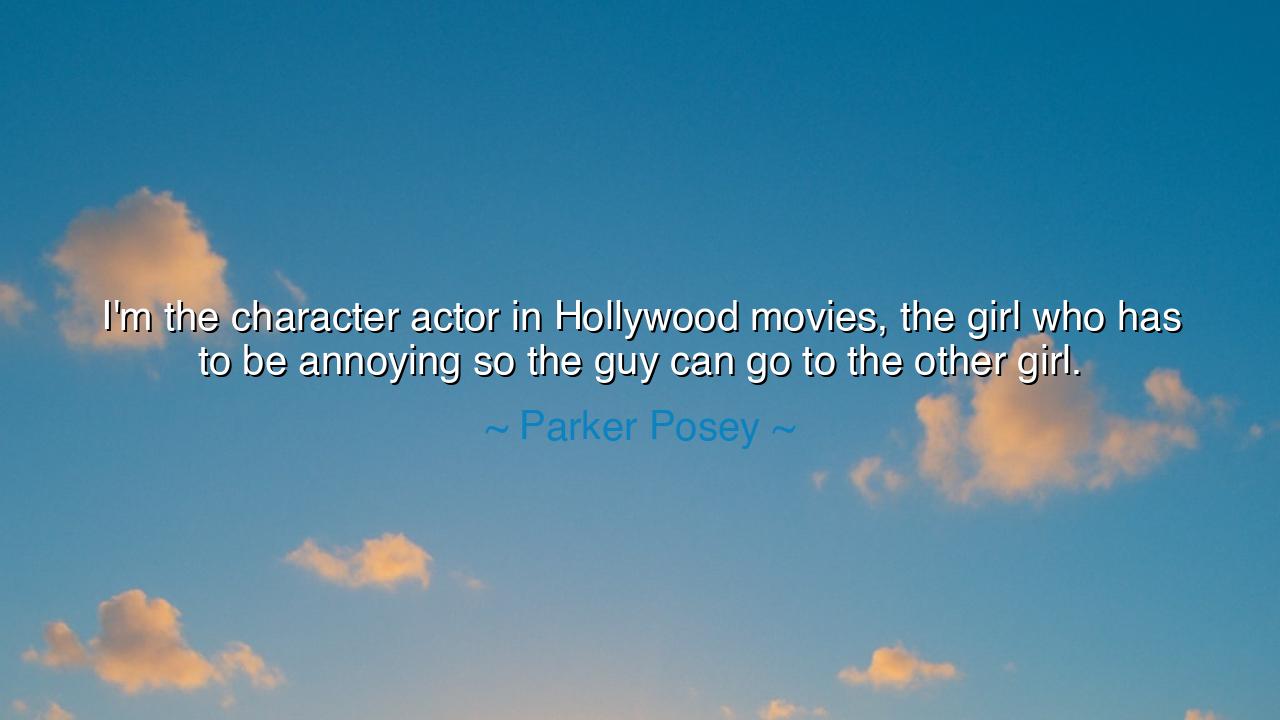
I'm the character actor in Hollywood movies, the girl who has to
I'm the character actor in Hollywood movies, the girl who has to be annoying so the guy can go to the other girl.






Parker Posey’s words, “I'm the character actor in Hollywood movies, the girl who has to be annoying so the guy can go to the other girl,” are a poignant reflection on the roles women are often given in the grand theater of life—roles that are too often defined by others' expectations and desires. Her words strike at the very heart of the limitations and stereotypes that are often imposed upon women in the world of cinema. The "annoying girl" is a trope, a character written not to be loved, but to serve a purpose in the story: to push the hero toward the other girl, the one who embodies the ideals of romantic fulfillment. It is a role that, though familiar, speaks to a much larger truth about identity, agency, and the nature of storytelling.
In Posey’s reflection, we see a deep critique of how women have been traditionally depicted in stories—especially in Hollywood films. These women are not allowed to be fully realized characters in their own right; instead, they are often cast in secondary roles, designed solely to move the plot in a direction that benefits the male protagonist. The "annoying girl" is not a fully fleshed-out individual but a mere obstacle in the hero's journey. Posey’s words, though delivered with a touch of humor, are a reminder of the realities of gender roles in cinema and in life. Women are often asked to perform not as themselves, but as exaggerated versions of what others expect them to be, sometimes reduced to caricatures, mere plot devices.
This dynamic is not unique to film. History is filled with examples of how women’s voices and stories have been marginalized, their agency diminished to serve the narratives of others. Consider the story of Antigone, the tragic heroine from Greek mythology. Antigone’s story is one of defiance—she chooses to bury her brother, despite the law, because it is the right thing to do. Her actions challenge the patriarchal structures of her time and ultimately lead to her death. Though her story is one of great strength and moral clarity, the power of her character is often overshadowed by the roles assigned to her—roles defined by the men in her life, from her father, Oedipus, to her uncle, Creon. In her defiance, she is not just challenging the law of the land, but the very structures that dictate how women’s voices are heard.
Posey’s acknowledgment of the "annoying girl" role draws attention to the way the world has often boxed women into certain types of characters—those that serve a narrative but are denied their own fullness. These roles are not just restrictive for women; they are limiting for all, for they fail to reflect the complexity of real human lives. In mythology, in history, and in film, women have too often been reduced to mere props, the supporting characters whose stories are secondary to the desires and aspirations of men. The truth, however, is that each woman is a story unto herself—each is a heroine in her own right, deserving of a voice that is fully realized.
We can learn from Posey’s reflection by understanding that no one’s identity should be defined by the roles others impose upon them. We are all, in some way, characters in the grand narrative of life, yet we must resist the temptation to let others write our stories for us. Do not allow others to reduce you to a mere plot device, serving the desires of others without considering your own needs, dreams, and goals. Embrace the full spectrum of your identity, and understand that you are not confined to the labels others give you.
Take the story of Joan of Arc, who, though a peasant girl, led an army and became a symbol of courage and resistance. Her role in history was not to be a supporting character in someone else’s story but to be the central force of her own. She defied the expectations of a patriarchal society and carved out her own path, driven by a higher calling. Her life was not about pushing someone else’s story forward, but about living her own truth. Like Joan, we too must learn to speak our own truths and stand firm in the roles we create for ourselves, no matter how unconventional they may seem.
The lesson in Posey’s quote is simple, yet profound: we must resist the roles that others try to impose upon us—whether we are women, men, or anyone in between. Like the characters in the stories we see, we have the power to shape our own narratives, to choose not to be the "annoying girl" or the background player, but to take center stage in our own lives. Do not allow others to define your worth based on what you are not, but rather, embrace the fullness of who you are. Like the heroes of history and myth, may we all have the courage to write our own stories, and in doing so, to become the true protagonists of our lives.






AAdministratorAdministrator
Welcome, honored guests. Please leave a comment, we will respond soon